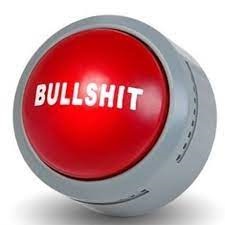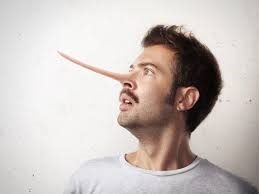I regularly get asked how to spot a bullshitter? We all know that ‘honesty is the best policy’ and that ‘the truth will out’ (just look at our former PM’s recent troubles!) but when it comes down to it, how honest are we really? Research tells us that on average we tell one to two lies a day and, more disturbingly, that we are lied to 10 to 200 times a day.

Are all lies necessarily ‘bad’?
I’m pretty sure that at some point in our lives we’ve all told our boss that we were late because of traffic or leaves on the line rather than admit the truth; that we slept in…and how many times have you told a friend or colleague that you like their outfit or haircut when in reality you weren’t that keen?….or acted elated over a gift you’ve received that deep down you know will make it to the charity shop before the week is out? Exactly.
It’s almost universally recognised and accepted that lying to protect someone’s feelings is ok – noble even, and as much as we all profess that we’d ‘rather know the truth’, there are definitely situations where lying is the preferred option for all concerned…
‘I had a great time, thank you…’
‘I don’t think you look like you’ve put on weight…’
‘Your baby is SO cute!…’
But this blog isn’t about the ‘white lies’, or the things that we say in order to make life a little bit more pleasant for ourselves and everyone around us (I’m not even going to get started on the stuff we tell our kids about Father Christmas or the Tooth Fairy!) – no, this is about the bullshitters.
Those people who simply can’t stop the lies flowing from their mouths whatever the circumstances. We’ve all known a Billy-Bullshitter; fantastical stories trip off the tongue at an alarming rate, and with detail and subplots that would make a fantasy-novelist jealous – and to be honest, these are normally pretty easy to spot and are simply met with a roll of the eyes and a knowing smile.
We rarely call them out on it because all too often it becomes a macabre source of amusement: ‘what will they say next?’ we wonder. Whatever it is, we know it’s all bollocks.
Why do they do this? It’s normally an ingrained habit born from a desire to impress. Perhaps they have an inferiority complex or don’t feel that their life matches up to the one they feel that they should have, or even simply to the lives of those around them.

Compulsive liars can be harder to spot because they’ll lie about the most mundane of things: they got up at 5am instead of 7am, went to the gym rather than sat in and watched Netflix, ate something they didn’t really eat, got sick when they didn’t…they’ll invent conversations that never happened, talk about encounters with people they’ve never even met… and when questioned will probably get defensive: ‘why don’t you believe me?’ ‘Why would I lie about it?’
If asked, most people would say that they can spot a pork pie merchant; they’ve seen or read enough stuff by body language experts to know that they have to look for blink rate and gaze aversion, but in most cases that’s wrong.
In fact, even if you’re convinced you can spot a liar a mile off, research tells us that most people are only as good as chance when it comes to identifying when someone is trying to pull the wool over their eyes.
So, in a world where, as it turns out, a lot of people are lying to us on a daily basis without us having a bloody clue, how do we separate the facts from the fiction?
FREE TRIAL on my MAD group if you really want to grow your business!
Here are 5 quick tips to help you find the pork pies!

1. They Struggle To Tell A Story In A Non-Linear Way
Well, there is no fool-proof way – depressingly, some people are just really, really good liars. But, here are some of the ways that could help you identify the better of the Billy-Bullshitters in your life.
In other words, they can bullshit their way through a story from start-to-finish almost flawlessly, but struggle when it comes to telling out of sync.
If you’re listening to a tale that isn’t quite ringing true, ask questions about what happened in a different order. Someone who is telling the truth will have no problem going back and forth along the timeline because they can’t be thrown off, because it’s factual and, to use a phrase I can’t actually bloody stand but is relevant here: it is what it is.
However, a lie – particularly a not very well rehearsed one – will soon fall apart once the timeline thread is picked at.

2. Liars Will Drop The Possessive

To put it more simply, a liar will try to distance themselves from the lie by using the word ‘I’ as little as possible. If the lie is in the form of an account of something that happened ‘I’ will often become ‘we’. It’s a clever way of distancing yourself from anything that could get you into trouble – safety in numbers and all that – and sharing the blame with other people. It’s a tactic often employed when you haven’t necessarily done anything that bad, but it’s still something that could cause an argument or bring up questions that you’d rather avoid, and so:
‘I just went down the pub and I ended up talking to this girl…’
Becomes:
‘We all went down the pub and we started chatting to these girls…’
Nothing particularly wrong with either of these scenarios, and the lie isn’t terrible – a conversation is just that; a conversation – but the latter would probably result in less probing questions from a partner, friend or colleague!

3.Using Passive Rather Than Active Voice
Again, this is about avoidance and the liar trying to distance themselves from their tall tale.
For example:
‘My boss asked me to work late’
In this sentence the boss is the subject and you are the object. A liar would likely rephrase this sentence and deliver in the passive voice:
‘Why didn’t you call me last night?’
‘I was asked to work late by my boss’
Much like the dropping the possessive, using passive voice rather than active voice avoids making the liar the subject – it’s not their fault, something happened to them, and so they can absolve themselves of a fair amount of the responsibility.

4. Repeating Common Words And Phrases
Someone who’s bullshitting is going to have to have to concentrate a fair amount in order to remember their lies and not trip themselves up, and so they’ll naturally resort to common words and phrases to reduce the ‘cognitive load’.
You’ll find that if the more you question them, the more they’ll repeat sections of their story in the exact same way. Someone who is telling the truth will vary up their expressions, but someone who’s lying will struggle to be able to do that. If you spot that someone has explained the same point word-for-word during their story when pressed, chances are they aren’t being entirely truthful with you.

5. Their Words And Body Language Don’t Match Up

Body language isn’t the be-all-and-end-all in spotting a bullshitter, but it can be obvious that someone is being less than truthful if they are saying one thing, but their body and facial expressions are saying something else entirely. A person who is declaring that they love your hair like that while slightly shaking their head, using a flat, toneless voice and perhaps displaying a defensive stance like their arms being folded, could be lying through their teeth.
Of course this isn’t a definitive list to spotting a bullshitter – let’s face it, if it was that easy we wouldn’t be falling prey to those 10-200 lies a day would we, but it’s a good starting point if you’re not convinced that someone isn’t always telling you the truth, the whole truth and nothing but the truth. And, if it’s YOU who likes to play fast and loose with the truth, at least you’ve got a bit of an idea of what it is that’s going to get you caught out!
